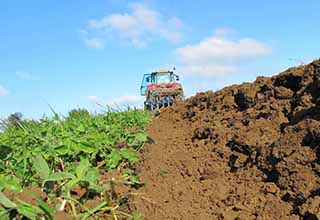An international group of scientists, led by Professor David Powlson, Lawes Trust Senior Fellow at Rothamsted Research, have published a critical review in the journal Nature Climate Change which concludes that the role of no-till agriculture in mitigating climate change may be over-stated.

No-till and reduced tillage are methods of establishing crops with minimum soil disturbance, in contrast to conventional tillage involving ploughing or other cultivation practices. No-till can deliver benefits in many, though not all, situations including improved soil quality and retention of water in soil for use by crops. This has a clear advantage in dry regions of the world.
No-till usually leads to an increase in the concentration of organic matter (measured as organic carbon) near the soil surface. This is often interpreted as an absolute accumulation or “locking up” of carbon in soil, termed carbon sequestration, leading to no-till being promoted as a form of climate change mitigation. This claim was recently restated in the 2013 UNEP Emissions Gap Report.
The review found that there was sometimes a genuine, but small, net accumulation of organic carbon in soil under no-till compared to conventional tillage. But, much of the observed effects result from a redistribution of organic carbon with depth – extra organic carbon near the surface but less deeper in the soil. In addition, the soil sampling methods normally used tend to exaggerate the effect. Consequently the climate change mitigation achievable from converting to no-till agriculture is likely to be over-stated.
The authors of the new paper conclude that no-till agriculture has a role to play as one of the strategies contributing to global food security and the protection of soils, and thus to climate change adaptation through building agricultural systems that are more resilient to climate and weather variability. In regions where no-till or reduced tillage is agriculturally appropriate it should be promoted on these grounds, but not on the basis of equivocal evidence for climate change mitigation. Climate change mitigation is a small, but useful, additional benefit, not the key policy driver for its adoption.
The review also states that those who promote no-till as a means of combating climate change frequently refer to the potential amount of additional carbon that may be stored, or sequestered, in soil. However, in the UNEP report and elsewhere, the barriers to adoption of no-till tend to be ignored. The authors argue that there are numerous social, practical and infrastructural factors that can make its adoption difficult for farmers, especially small and resource-poor farmers in developing countries. These issues are being addressed by CIMMYT and others but progress in overcoming the barriers is often slow. Thus, even where there is a real potential for mitigating climate change, it is often difficult to achieve in practice.
Professor David Powlson of Rothamsted Research, which receives strategic funding from BBSRC said “Over-stating the climate change benefits of no-till is serious as it gives a falsely optimistic message of the potential to mitigate climate change through altered agricultural practices.” He added “if the climate change mitigation achievable through adopting no-till is far less than claimed, then there is even more pressure to decrease greenhouse gas emissions from other aspects of agriculture, and from other sectors of human activity”.
